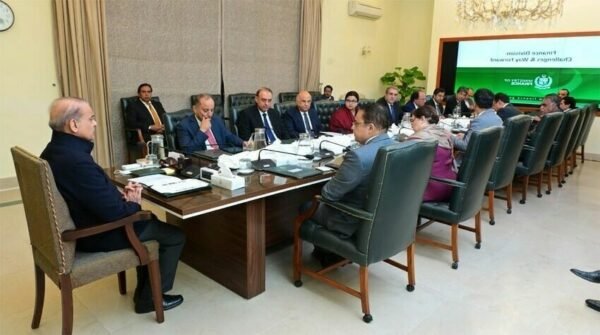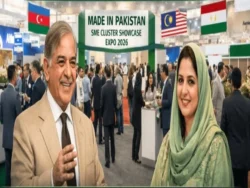SIFC: where vision meets action

21 April 2024
Published in: Business Recorder
The unveiling of SIFC (Special Investment Facilitation Council) marks the Government of Pakistan’s comprehensive ‘Economic Revival Plan’ in response to the economic challenges faced by the country.
The SIFC was established as a “Single Window interface” to expedite project development and implement a consistent strategy for potential investors.
A comprehensive and inclusive approach was implemented to promote collaboration between the federal and provincial governments for efficient development and execution. This approach prioritized investors and expedited approvals through a well-coordinated process.
The active involvement of both the Federal and Provincial Governments demonstrates the strong determination of the country to revive the economy. Syed Asim Munir, the Chief of the Army Staff, affirmed the Pakistan Army’s unwavering support to complement the Government’s Economic Revival Plan, which is seen as crucial for the socio-economic well-being of Pakistanis and the restoration of Pakistan’s rightful position among the international community.
By engaging in partnerships and cooperation with diverse sectors of the economy, particularly agriculture, minerals and mining, information technology (IT), energy, and defense production, SIFC has played a pivotal role in facilitating the identification of investment prospects, tackling obstacles, and fostering a favorable climate for investment and economic advancement in Pakistan. The primary objective of this council is to make a meaningful contribution towards the economic revitalization of the country. By functioning as a unified platform for both domestic and international investors, it effectively reduces the intricacies and time constraints associated with corporate procedures.
The primary objective of the SIFC is to attract investment from amicable nations, with the immediate aim of augmenting FDI to US $5 billion and reaching US $100 billion within three years. Additionally, the SIFC aims to attain a nominal GDP of US $1 trillion by the year 2035. As of now, SIFC has decided to allocate resources for a minimum of twenty initiatives. The platform is currently exploring Pakistan’s potential in many industries, resources, and portfolios. Extensive research is currently being conducted to ascertain the feasibility of mining rare earth minerals in the northwest and northern regions of the country.
Several projects have been identified for the acceleration of the process. These projects include a large number of national and international contracts with oil refinery companies, energy sectors, coal and mining companies, hydropower projects, cloud-based infrastructures, solar project installation, and advanced telecomfacilities. Significant progress has been achieved in various domains, including the delayed Reko Diq initiative, enhancing the efficacy of Distribution Companies (DISCOs), and leading to the privatization of national carrier PIA.
The SIFC has rapidly positioned itself as a proponent for Pakistan’s security, stability, and development on the global stage. This exemplifies the concerted efforts of the civil-military complex to collaborate. A few days ago, Prince Mohammed bin Salman announced plans to bring 25 billion dollars to Pakistan through SIFC, marking the council’s finest accomplishment. Furthermore, Saudi Arabia will make a substantial investment of up to one billion dollars in the Reko Diq Copper Gold project.
Pakistan has entered into a bilateral deal worth $200 million with a Chinese company to facilitate the transition of a thermal power plant to solar energy. The agreement, facilitated by SIFC, aims to enhance the capacity of an existing thermal power plant by converting it into a 300-megawatt solar power facility. Furthermore, Shanghai Electric is interested in the mining sector of Pakistan. The implementation of this strategic maneuver could have substantial benefits for energy generation and economic development. Pakistan possesses essential minerals that play a crucial role in the worldwide energy transition and have the potential to attract investors throughout the whole mining process.
BYD, a prominent electric car manufacturer in China, has expressed its intention to invest in Pakistan for the production of advanced electric vehicles, in collaboration with Mega Conglomerate Private Limited. This development is consistent with Pakistan’s endeavors to mitigate carbon emissions and encourage the adoption of energy efficient modes of transportation. The investment made by BYD is indicative of the endeavors undertaken by the SIFC to attract foreign investors. In addition, Pakistan and China have reached an agreement to form a Working Group (WG) dedicated to five new economic corridors as a component of the second phase of the CPEC. The WG will concentrate on key sectors such as job generation, innovation, sustainable energy, and regional progress. The SIFC is currently engaging in efforts to eliminate barriers in this context.
Significantly, the ‘Semiconductor Industry Development Plan’ is being implemented by SIFC to attract billions of dollars in investment to the country. The project’s primary objective is to concentrate on the design of semiconductors, which would create more opportunities for Pakistan. With a plentiful and highly skilled workforce, Pakistan has the potential to attract a trillion-dollar industry on a worldwide scale. Pakistan has the potential to become the leading location for the manufacturing and testing semiconductor sector, following the success of the design.
SIFC is actively engaged in harnessing Pakistan’s vast natural resources. The objective is to expedite the establishment of a federal Mines and Minerals Division to rejuvenate the mining sector through the implementation of standardized rules and regulations nationwide. The Pakistan Mineral Development firm has just entered into a formal arrangement with an American firm to facilitate the exportation of pink salt. This development represents a notable advancement in the utilization of Pakistan’s plentiful mineral resources for the sake of international trade and commerce.
More importantly, the SIFC is implementing proactive measures to tackle Pakistan’s educational obstacles and harmonize its system with global benchmarks. As of now, there are more than 26.2 million children who are not attending school, and 40% of those under the age of 10 do not have access to education. The need for immediate action is evident, as emphasized by the most recent Annual Status of Education Report (ASER-2023), which emphasizes the urgent requirement for high-quality education in Pakistan. SIFC is actively engaged in close collaboration with both federal and provincial governments to implement educational policy reforms and address the existing disparities.
One of the primary projects undertaken by SIFC entails the establishment of technical and vocational training institutes, in addition to the improvement of fundamental educational standards. The primary objective of these endeavors is to enhance the caliber of Pakistan’s labor force at a global level, while simultaneously making significant contributions to the worldwide labor market. Pakistan and China are engaged in a collaborative effort to augment technical vocational training.
It is crucial to acknowledge that SIFC has emerged as a potent catalyst, purposefully engineered to enhance investor confidence and accelerate the implementation of crucial projects. Moreover, SIFC assumes a pivotal function in attracting investors to Pakistan. A visa service has been implemented by the SIFC, which confers advantages to both investors and enterprises. Through financial investments, this service intends to aid international entrepreneurs who desire to establish operations in the country. Moreover, its objective is to generate prospects fordigital transformation.
The first IT and ITeS export strategy of Pakistan was developed through a collaborative effort between the Pakistan Software Export Board, which operates under the Ministry of IT and Telecommunication, PricewaterhouseCoopers (PwC), and many international partners, including faculty members from the University of Oxford. The objective of this strategy is to enhance Pakistan’s knowledge technology exports to a value of $10 billion over the next three years. This statement is the overarching objective of the SIFC, which seeks to attain economic stability and foster the attraction of foreign investment.
SIFC has accomplished thirteen out of the fifteen objectives established throughout the preceding eight-month period, thereby contributing to the advancement of the information technology sector and the augmentation of exports. SIFC has shown remarkable efficacy in efficiently achieving its objectives. The objective is to have faith in the procedure and consistently offer assistance to the corporation by establishing a business-friendly atmosphere devoid of corruption.
The Council has been in operation for over a year and has garnered interest from investors at both local and global levels. The execution of many agreements with both domestic and foreign investors, valued at hundreds of millions of dollars, signifies a revitalized confidence in Pakistan’s capacity to attract and enhance domestic and global investment opportunities.





